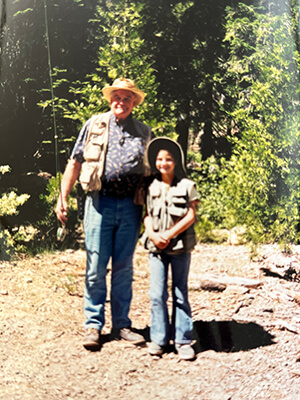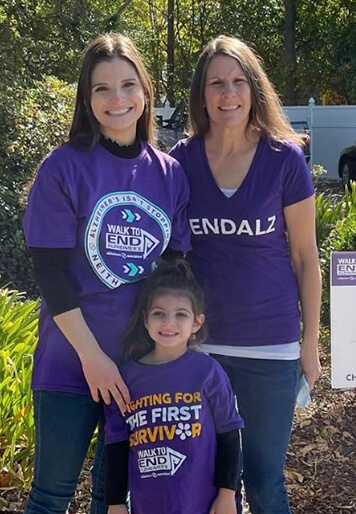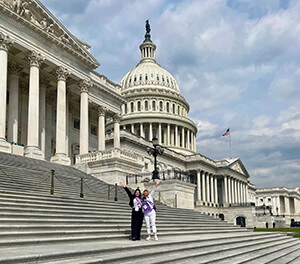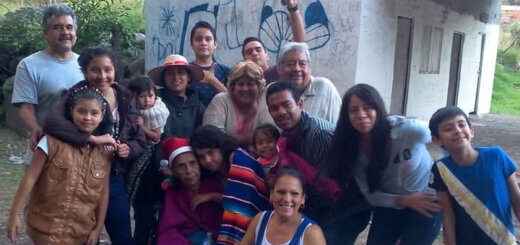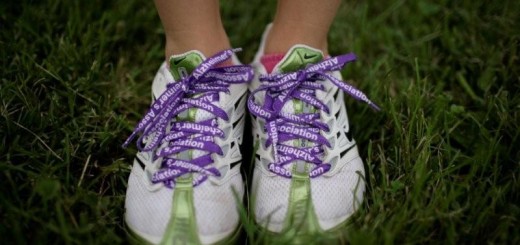From fundraising to advocacy: Finding a new passion in volunteering
Markie Hardesty is a longtime volunteer for the Alzheimer’s Association®. After spending nearly 15 years volunteering with the Alzheimer’s Association Walk to End Alzheimer’s® she found she was in need of a change. Now, Markie is an advocate for her congressional district in Chico, California. She shares what it’s like to make an impact on health policy through her work and encourages others to join her.
Caring for Grandma
Markie Hardesty grew up with not one but two grandparents who lived with dementia. When her maternal grandmother, Marie, was initially diagnosed, Markie was young. “[My grandma] called herself kooky,” said Markie. “She never forgot who we were and struggled with the rules of Go Fish. She loved us and was our goofy pleasantly confused grandma.”
Over the next decade, Markie’s family cared for Marie. At first, Markie’s mom would bring her parents dinner every night. When it became clear that Marie needed more care than her husband could provide, Markie’s grandparents moved to Napa. Marie moved into a care setting that her son worked at and remained there until she died.
Caring for Grandpa
In 2008, when Markie was a young adult, she began working as a caregiver at Country Village, a local care setting in Chico. “I loved it,” said Markie. “I started as a caregiver [at the care setting] and was promoted several times until I became an admin who ran the whole facility.”
It was during this time, that Markie’s paternal grandfather was also diagnosed with dementia. Unfortunately, his diagnosis was caught in the later stages of the disease and the family decided to place him in the care setting that Markie worked at. Markie said, “It was interesting being in the caregiver role and not the granddaughter [role].”
Because Markie’s grandfather was in the late stage of the disease, he didn’t know who Markie was. However, there was a moment that Markie recalls fondly, “One day I was walking by, busy with the drink cart and he puts his arm up and said, ‘Hey Markie,’ my heart stopped. I looked at him and said, “What did you call me?’
“That was a reminder that he’s still there, he still loves me even if he doesn’t remember my name. It reminded me to slow down and pay attention to these people I’m caring for. It was the coolest thing when he did that.”
When Markie’s grandfather died, Markie was able to be there with him until the end. “I have been doing this job for so long,” said Markie. “I’m very comfortable with the death and dying process. It’s a very beautiful process and it’s important that those of us that are caring for these people make it that way.”
Moving on from Walk
Because of her connection to the disease, and the work that she did at the care setting, Markie felt very connected to Alzheimer’s. In 2009 she began volunteering for the Alzheimer’s Association. “The families and the staff [at the care setting] are a big reason why I volunteer,” shared Markie.
For nearly 15 years Markie has spent every year volunteering on the committee for the Walk to End Alzheimer’s in Chico. The Walk is the world’s largest fundraiser for Alzheimer’s care, support and research. This inspiring event calls on participants of all ages and abilities to join the fight against the disease.
Committee members play a key role in the success of each event, from getting local companies involved to helping participants engage with our mission to planning the event experience. Markie was in charge of the logistics for the day of the event. On Walk day, Markie and a small team of volunteers would arrive at Bidwell Park early in the morning and help with setting up.
“My favorite part was arriving before the sun came up, meeting everybody there and watching everything come to life,” said Markie. “Volunteers and [participants] trickle in and I sit back and watch all these people come together for something that’s so important for all of us.”
While Markie still loves Walk, she was understandably ready for a change. “I’m a single mom, I’m getting my master’s degree and I need to see what is out there,” said Markie. “[The cause] is really important to me and I know there are other ways to help.”
Finding a new passion
After reaching out to the Association for a new volunteer role, she was introduced to Veronica Mijic, the Association’s local public policy and advocacy manager. Together they found a new role for Markie on the advocacy team, as the ambassador of California’s first district.
As the ambassador she connects with her local representative, Congressman Doug LaMalfa, to discuss current legislative priorities. She helps set up calls both between the congressman and his office, and with local advocates. “I had my first in person meeting with LaMalfa in early February,” said Markie. “It was really exciting. [We talked] about what [the Association] is doing and what we need help with.
“[Alzheimer’s disease] is happening here to the people he represents. It is especially important in this rural area of the first district. We don’t have resources or medical facilities like in the Bay Area and Sacramento. [Putting money towards these bills] will help train physicians here to better treat [people] with Alzheimer’s disease. The hard sell is getting him to buy into that. Yes, this is a lot of money but this is what it’s going to take to care for these people.”
A trip to Washington D.C.
In April of this year, Markie was able to join the Association at the capital in Washington D.C. The Alzheimer’s Impact Movement (AIM) Advocacy Forum is the nation’s premier Alzheimer’s disease advocacy event. Volunteer advocates from across the United States come together to make the case to federal policymakers to advance policies to improve the lives of all individuals affected by Alzheimer’s and all other dementia.
“It was great. I’d been to Summit [a volunteer forum] for Walk,” said Markie. “I had felt that shared experience of fighting for something [to create] change. With forum, it felt different. We were actively working on that change while we were there. It’s one thing to go to the local office and talk to LaMalfa. Going to Capitol Hill and see these buildings where important decisions are being made, it felt more real.”
Fighting for something important
Markie encourages others to consider becoming an advocate. With a flexible time commitment and an empowering group of passionate people it’s an amazing experience for all. “It’s easier to schedule around your own time, which is a relief for me,” said Markie. “You will meet some of the most amazing people, you will be able to fight side by side with them, for something that is important to families and community.
“You will have the opportunity to actively work towards making a change to our health care system, and to the way that amount of money is spent working at finding a cure for this disease. It feels like a lot, and it feels nerve racking talking to these important people. The reason they do what they do is at the root, for us, it’s important to tell them the things we need and how we would like our money spent.
“These people seem so big and mighty and scary, but they’re just people and they’re just doing a job and their job is to serve us and I think we’ve forgotten. They serve everyone and we need to remember that.”
Volunteers are the key to making a difference in the lives of people facing Alzheimer’s and dementia. When you volunteer with the Alzheimer’s Association, you join a network of passionate people who are working to fight this devastating disease, honor loved ones, and bring care and support to those who need it.
If you’re interested in becoming an advocacy volunteer for your district visit alz.org/advocate. For all other volunteer opportunities visit alz.org/norcal/volunteer.






